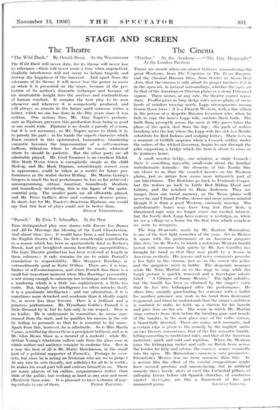The Cinema "Fredlos." At the Academy—" The Gay Desperado." At
the London Pavilion THERE are moods when one almost believes, remembering the great Westerns, from The rirginian to The Texas Rangers, and the classical Russian films, from October to Storm Over Asia, that the cinema is only about its proper business if it is in the open air, in natural surroundings, whether the open air be that of the American or Siberian plains or a stony Petrograd square. These scenes, at any rate, the theatre cannot repro- duce. Fredlos gives us long sledge rides across plains of snow, herds of reindeer moving north, Lapp encampments among frozen thorn trees : it is a Finnish Western, with a fine villain in the person of a despotic Russian Governor who, when he fails to rape the hero's Lapp wife, outlaws them both. The knife flung promptly across the snow at fifty paces takes the place of the quick shot from the hip ; the pack of wolves breaking into the but where the Lapp wife lies sick is a Nordic substitute for Red Indians and scalping knives. There is even a moment of Griffith suspense when a Cossack soldier, under the orders of the wicked Governor, begins to saw through the piles supporting a bridge which the hero is about to cross as he journeys home.
A small wooden bridge, one reindeer, a single Cossack : there is something agreeably small-scale about the familiar melodramatic formula : the elements of this Nordic film are closer to us than the crowded heroics on the Western plains, just as nature here seems more intimately part of our inheritance. The ,Redskins go back to Fenimore Cooper, but the wolves go back to Little Red, Riding Hood and Grimm, and the reindeer to Hans Andersen. They are images from our racial memory, as the Texas plains will never be, and I found Fredlos, slower and more serious-minded though it is than a good Western, curiously moving. The melodramatic bones may have long lost their flesh, a threatened rape may no longer rouse our excited interest, but the lovely dark Lapp faces convey a nostalgia, as when we see a village or a house for the first time which somehow we seem to recognise.
The Gay Desperado, made by Mr. Reuben Mainoulian, is one of the best light comedies of the year. Set in Mexico it opens with the performance of an American gangster film, Give 'cm the Works, to which a notorious Mexican bandit (acted with immense high spirits by Mr. Leo Carrillo) has brought his band so that they may profit by a lesson in American methods. His joyous and noisy comments provoke a free fight in the cinema, just as on the screen the police and the gangsters meet in battle. The desperate manager sends Mr. Nino Martini on to the stage to sing, while the tough picture is quickly removed and a travelogue substi- tilted " A Glimpse of Sunny Mexico." The fight subsides, but the bandit has been so charmed by the singer's voice that he has him kidnapped after the performance. He offers him, casually punctuating his sentence with a bullet for another prisoner, any rank in his band from lieutenant to general, and when he understands that the singer's ambition is confined to radio, he holds up a station for his benefit and puts him on the air. The scene in which Mr. Martini sings extracts from Aida before the bristling guns and beards of the bandits, in the neat glass cage of the radio station, is beautifully directed. There are many such moments; and a certain edge is given to the comedy by the implicit satire on two literary conventions, that of the free romantic bandit, killing according to traditional rules, and that of the American racketeer, quick and cold and reptilian. When the Mexican joins the kidnapping racket and calls on Butch from across the border for help and advice, the contrast comes comically into the open. Mr. Mamoulian's camera is very persuasive : Eisenstein's Mexico was no more sensuous than this. In a serious film the effect of the careful compositions might have seemed precious and unconvincing, but in artificial comedy these lovely shots of cacti like Cathedral pillars, of galloping horses before old Spanish churches, of sombreros against skys:.-.pes, are like a framework of fine and














































 Previous page
Previous page